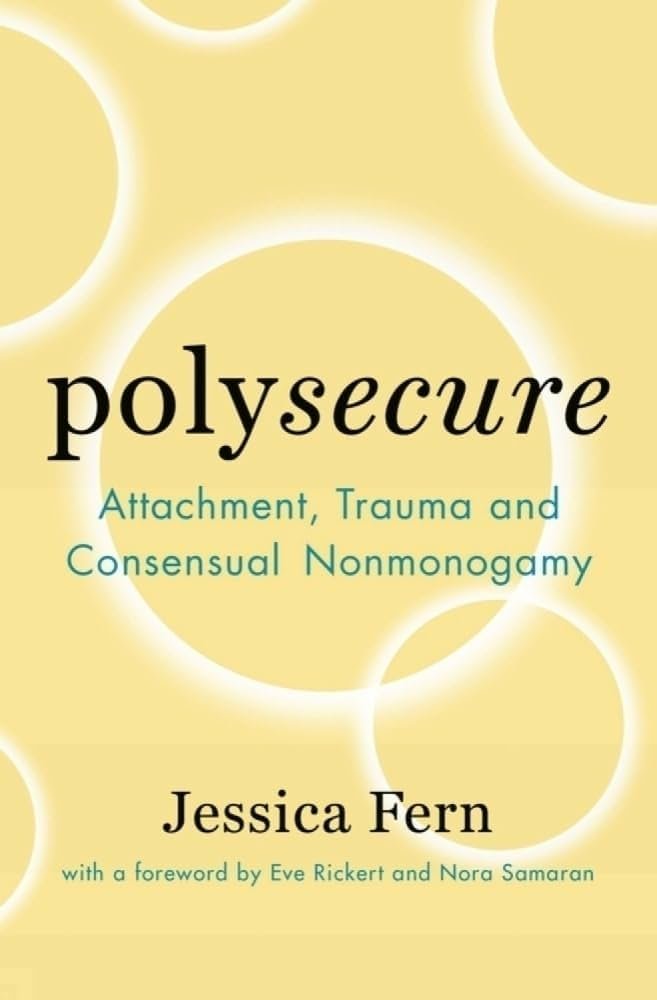Book Report: Polysecure: Attachment, Trauma, and Consensual Nonmonogamy by Jessica Fern
Polysecure, written by therapist and relationship coach Jessica Fern, offers a comprehensive exploration of attachment theory within the context of consensual nonmonogamy (CNM). The book delves into how individuals in polyamorous or open relationships can cultivate secure attachment bonds while navigating the complexities of multiple romantic and sexual connections. Fern's approach emphasizes healing trauma, understanding attachment styles, and applying these concepts to polyamorous dynamics, making the book a key resource for individuals seeking to maintain both security and autonomy in CNM relationships.
Summary: Fern begins by outlining traditional attachment theory, which was developed to explain the emotional bonds between caregivers and children, and later extended to romantic relationships. She explains the four main attachment styles: secure, anxious, avoidant, and disorganized. Each style describes patterns of behavior in relationships, including how people seek intimacy, handle conflict, and react to perceived threats to connection.
In Polysecure, Fern adapts attachment theory to the unique challenges of consensual nonmonogamy. She explores how people can experience attachment needs and security differently when multiple partners are involved. For instance, individuals may face challenges such as jealousy, insecurity, and fear of abandonment in CNM relationships, which can be compounded by their personal attachment histories. Fern argues that understanding attachment styles helps individuals build secure connections with multiple partners.
A key part of the book is Fern's emphasis on the role of trauma. Many people experience early attachment wounds that carry over into their adult relationships, and these wounds can be triggered in polyamorous dynamics. Fern provides practical advice on how to work through these attachment wounds, develop self-awareness, and communicate needs effectively with multiple partners.
Fern also introduces the concept of "secure attachment within autonomy"—an idea that security does not mean dependency, but rather the ability to form deep, trusting bonds while maintaining a sense of independence. She stresses that polyamorous relationships have the potential to foster both security and freedom, and she encourages readers to cultivate secure attachments with themselves as a foundation for healthy CNM dynamics.
Themes:
Attachment Theory in Nonmonogamy: The book's core theme revolves around adapting attachment theory to polyamorous relationships. Fern provides insights into how attachment styles manifest in nonmonogamy and offers tools for building secure attachments across multiple connections.
Healing Trauma: Fern acknowledges that trauma and early attachment wounds can influence how individuals navigate relationships, particularly in polyamorous contexts. She offers practical strategies for recognizing and healing these wounds, both individually and in partnerships.
Security and Autonomy: One of the book's primary messages is that security and autonomy can coexist. Fern encourages readers to seek secure attachment bonds without losing their sense of individuality and independence.
Communication and Emotional Intelligence: Fern emphasizes the importance of open communication, emotional intelligence, and vulnerability in nonmonogamous relationships. She highlights the need for partners to communicate their attachment needs, boundaries, and expectations in order to foster trust and security.
Analysis: Polysecure is a groundbreaking work that fills a gap in the literature on consensual nonmonogamy by integrating attachment theory with the realities of polyamorous relationships. Jessica Fern's approach is compassionate and insightful, making complex psychological concepts accessible to a wide audience. The book is especially valuable for those interested in deepening their understanding of how attachment patterns affect relationships, both monogamous and nonmonogamous.
One of the book's strengths is its focus on practical applications. Fern provides exercises, reflective questions, and case studies to help readers identify their own attachment styles and work toward secure connections. Her emphasis on healing trauma is particularly helpful, as many readers may struggle with unresolved attachment wounds that affect their relationships.
While the book is written with polyamorous individuals in mind, its insights are broadly applicable to anyone interested in attachment theory or improving relationship dynamics. Monogamous readers can also benefit from Fern’s discussions on security, communication, and autonomy.
Conclusion: Polysecure is an essential read for those practicing consensual nonmonogamy or interested in exploring attachment theory within the context of multiple relationships. Jessica Fern offers a compassionate, trauma-informed perspective that empowers readers to cultivate secure, trusting bonds while maintaining personal autonomy. Through its blend of psychological theory and practical advice, Polysecure provides valuable tools for anyone seeking healthier, more fulfilling connections in both polyamorous and monogamous relationships.
I’m a Sex Counselor and Yoga Teacher. I work with individuals, couples, non-monogamous relationships, and groups in topics related to sexuality, emotional regulation, communication dynamics, and changing behaviors.


